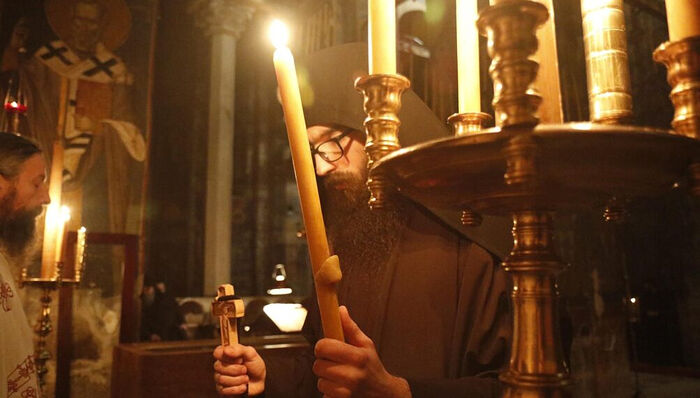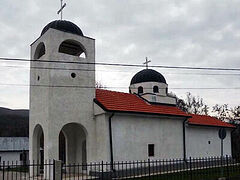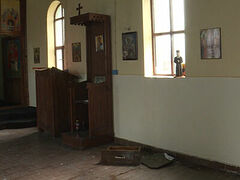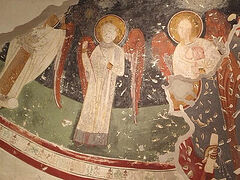Washington, D.C., April 27, 2021
His Grace Bishop Irinej of the Eastern American Diocese of the Serbian Orthodox Church appealed last week to Secretary of State Antony Blinken to do everything he can to protect the persecuted Serbs and Serbian Orthodox Church in Kosovo and Metohija.
His appeal comes after a number of recent attacks against Orthodox holy sites in Kosovo, and after Visoki Dečani Monastery was included in a list of the seven most endangered European cultural heritage sites, which greatly angered the Albanian authorities in Kosovo and provoked malicious accusations against the monastery and its abbot Archimandrite Sava (Janjić).
In his letter, dated April 22, Bp. Irinej draws attention to the recent attacks against holy sites and the constant violation of human rights in Kosovo. The ethnic persecution by the Kosovo Albanians is “of particular concern to American Serbs, who expect condemnation from US authorities,” writes the Eastern American Diocese.
In an agreement signed with Serbia in Washington in September, Kosovar Prime Minister Avdullah Hoti pledged to protect religious freedom and Serbian Orthodox religious sites. However, there have been a number of attacks since then. Several churches were attacked just in the month of March.
Concerning the latest attacks and slander against Visoki Dečani and Abbot Sava, Bp. Irinej also forwarded the official statement of His Grace Bishop Teodosije of Raška and Prizren on the endangerment of the Serbian spiritual and cultural heritage in Kosovo and Metohija, which can be read below.
His Grace called on the Secretary of State “to do everything in his power with the Kosovo authorities to stop ethnic violence against Serbs and the persecution of the Serbian Orthodox Church and its clergy and monastics, and to respect the basic human and religious rights of Serbs in Kosovo and Metohija.”
Read Bp. Teodosije’s official statement:
ON THE ENDANGERMENT OF THE VISOKI DEČANI MONASTERY AND SERBIAN SPIRITUAL AND CULTURAL HERITAGE IN KOSOVO AND METOHIJA
Following the decision of the reputable European NGO for cultural heritage EUROPA NOSTRA from April 8th, 2021, to include the monastery Visoki Dečani, in addition to several other cultural and historical sites in Italy, Austria, Northern Macedonia, Croatia, and Greece, in this year’s list of the seven most endangered cultural monuments in Europe, for days now, we have been witnessing an organized campaign conducted by Kosovo institutions, Kosovo Albanian CSOs (some of which are known for their extreme nationalism) and part of the K/Albanian media.
This campaign aims to present EUROPA NOSTRA as an organization that was reportedly instrumentalized by the Government of the Republic of Serbia and the Serbian Orthodox Church (SOC), thus further endangering the holy sites of our Church in Kosovo and Metohija, especially the monastery of Visoki Dečani.
First, on March 18th, 2021, the current leading figures of Kosovo institutions (Albin Kurti and Vjosa Osmani) sent a letter to the organization EUROPA NOSTRA, which was published by the new Minister of Culture, Hajrulla Ceku. On Saturday (April 16th), 40 Albanian CSOs in Kosovo wrote a public letter, in which they harshly criticized EUROPA NOSTRA’s decision, alleging that the inclusion of Visoki Dečani Monastery in the European list of seven most endangered cultural heritage monuments creates a “false reflection of the reality in Kosovo” and that the data on the nomination “mainly comes from the reports of Serb institutions”. These organizations claim that “the universal values of the sites that UNESCO has placed on the World Heritage List have already been recognized” while making no mention of the fact that all four of our UNESCO monuments have been on the UNESCO World Heritage in Danger list since 2006, and that the Dečani monastery is still under KFOR military protection due to real security risks. As the Bishop of Raška-Prizren and long-term Abbot of the monastery Visoki Dečani (1992-2011), I feel the need to react publicly and express my deepest concern because the long-standing campaign of desecration and destruction of Serbian Orthodox religious and cultural heritage in Kosovo and Metohija now continues with aggressive institutional and political pressure from Kosovo institutions, as well as a negative media campaign led against the Church, and especially the monastery of Visoki Dečani.
Europa Nostra listed the Visoki Dečani Monastery, as one of the most important UNESCO monuments in this part of Europe, among the seven most endangered cultural monuments this year, primarily bearing in mind that UNESCO itself recognized that it is endangered. The goal of this decision is not politically motivated (because the list includes monuments from several European countries), but a sincere intention to encourage improved protection and a more tolerant attitude toward this important monument and the holy site of the SOC. After all, cultural heritage should bring people together, not separate them. However, the monastery of Visoki Dečani has been under the strong protection of the international forces of KFOR for 21 years, especially the Italian contingent, which has been guarding this monastery this entire time. Visoki Dečani is currently the only religious building in Kosovo and Metohija under the protection of KFOR, but also the only religious building and UNESCO monument in Europe under such military protection. And this is certainly not for no reason, as evidenced by the following facts:
-
The first armed attacks by Albanian extremists close to the KLA began immediately after the end of the war and the arrival of international peacekeeping forces. In February and June of 2000, several mortar shells were fired at the Visoki Dečani monastery. After the attack, the presence of KFOR forces increased, and the monastery was secured by armored vehicles for a while, and the monks traveled under military escort for years. It was not protection from peaceful neighbors but from extremist armed groups of Kosovo Albanians, who destroyed or severely damaged 107 Serb Orthodox churches in those months (as documented in detail in a photo archive), persecuting the Serb people at the same time, even though the armed conflict was over.
-
In the “March pogrom” (March 17th – March 18th, 2004), when Kosovo Albanian extremists brutally destroyed or severely damaged another 35 Serbian Orthodox shrines throughout Kosovo and Metohija in just two days, on the night of March 17th eight mortar shells were fired at the Visoki Dečani Monastery. An investigation was conducted and documented by the Italian contingent of KFOR. The next day, approximately 400 Kosovo Albanians gathered in the town of Dečani intending to directly attack the monastery, but they were prevented at the very last moment, primarily thanks to the mediation of numerous international officials and especially the then commander of NATO’s southern flank, (now retired) US Admiral Gregory G. Johnson, who personally told us what he did that night to prevent an attack on the monastery. After this attack, KFOR again increased its presence and organized several checkpoints. Regular KFOR exercises were carried out to prepare to respond to new attacks. In order to additionally protect the monastery, in 2004, Dečani was included in the list of UNESCO World Heritage Sites. After two years, the monasteries of the Patriarchate of Peć, Gračanica, as well as the church of Our Lady of Ljeviš in Prizren were added to the list, and in 2006, UNESCO placed all four mentioned monuments, that is, all four holy sites of the Serbian Orthodox Church in Kosovo and Metohija on the list of World Heritage Sites in Danger, where they remain even today – 15 years later. The current president of the USA, the then senator Joe Biden, spoke in the Senate on March 9, 2005, about the endangerment of the Dečani monastery (there is a preserved transcript of his speech), but also about how Dečani monks provided sanctuary to refugees during the war, regardless of their ethnicity, which prominent Western media repeatedly reported about both during and after the conflict. Mr. Biden visited the monastery of Visoki Dečani twice. Once as a senator in 2005, and the second time as Vice-President of the United States in 2009, when he highlighted the positive role of the monastery during the 1999 conflict.
-
On March 30th, 2007, a RPG grenade was fired at the Visoki Dečani Monastery from a nearby hill. Fortunately, the grenade hit the medieval wall of the monastery, but not the church itself, which was the target. Immediately after the attack, on April 6th, 2007, UNESCO Secretary-General Koichiro Matsuura condemned the attack on this World Heritage Site in a written statement on behalf of UNESCO. Although, immediately after the attack, the Association of KLA War Veterans in Dečani, with the help of local Albanian media, accused Serbs and even the monastery itself, of orchestrating the attack, after a police investigation, local ethnic Albanian Jeton Mulaj was arrested, whom the court in Peć/Peja sentenced to three and a half years in prison on October 13th, 2014, for attacking the monastery.
-
The next incident took place on October 13th, 2014, when the outer walls of the monastery were covered with graffiti of the terrorist organization ISIS and KLA, along with the inscription in English: “Caliphate is coming”. Kosovo police launched an investigation, but the perpetrators have never been found. KFOR further increased the protection of the monastery and the number of patrols.
-
In the evening of January 31st, 2016, four Kosovo Albanians (Kushtrim Kurti, Kushtrim Rama, Alban Kelmendi, and Arben Ymeri), who were in a vehicle at the time, were arrested in front of the monastery. After searching the vehicle, the Kosovo Police and KFOR found weapons and publications, which indicated possible links to ISIS. Several Kosovo media outlets soon reported that the Kosovo police found even more weapons and the flag of the terrorist organization ISIS during a search of Kushtrim Kurti’s home. The arrest of four Kosovo ISIS sympathizers in front of the Dečani monastery in January 2016 was also recorded on video cameras. Unfortunately, the Kosovo police did not show any interest in the video footage from the monastery’s security cameras, while the investigation into the obviously planned terrorist attack was conducted in detail by the military intelligence services of the Italian and German KFOR. Two of the four men arrested were on an international list of persons linked with terrorism. After the incident, several additional KFOR security cameras were installed, and for the first time, several KFOR soldiers were stationed in the monastery for better security. According to a police officer from Dečani, who wished to remain anonymous, explosives were found in the spare tire, in the vehicle belonging to the arrested. At that time, a significant number of young Albanians from Kosovo took part in the war in Syria under the black flag of ISIS, which numerous international media wrote about, including the New York Times.
These are just the most important security threats that the monastery of Visoki Dečani has faced in previous years. In recent years, the Visoki Dečani Monastery, as well as our entire Diocese in Kosovo and Metohija, have faced institutional pressures, threats, media attacks, as well as open disrespect of Kosovo laws:
-
First of all, we should mention the attempt to build the Dečani – Plav (Montenegro) highway, which was prevented in 2013 following an intervention of the US Embassy in Pristina and the office of the then US Vice President, and the current President Mr. Joe Biden and his then chief of staff, and current US Secretary of State Antony Blinken, after their meeting with then Prime Minister Thaci. The international institutions sent a clear message to Kosovo officials that under Kosovo law, transit roads (especially of an international character) cannot pass through a Special protective zone. However, the authorities of the municipality of Dečani and the new government of Kosovo did not give up on their intention to build the disputed road without a bypass. In 2018 and 2020, the ambassadors of leading western countries reacted to the illegal works being carried out in the protective zone of the monastery, and in November 2020, a final decision of the Council for Protective Zones (IMC – Implementation Monitoring Council) was made that the highway should not be built through the protective zone – just a bypass road. A detailed legal opinion on this issue had previously been provided by the legal teams of the EU Office and the OSCE. Rehabilitation of the local road through the zone would be approved only if it takes place along with the construction of the bypass road and, of course, with the prohibition of heavy transit traffic. From November 2020 – when the IMC decision was made and signed by all members of the Council, including the mayor of Dečani, who agreed with the decision – unfortunately, no step has been made to start the construction of the bypass road. Thus, any works on the local road, according to the decision of the Council for Protective Zones, are not permitted and would be a violation of the law and the decision of the Council. The claim, mentioned in the letter of Kurti-Osmani, that this is not an international road is not true, because the municipality of Dečani officially announced the construction of this road with the Montenegrin municipality of Plav with the support of the two previous prime ministers of Kosovo. On June 16th, 2020, Prime Minister Hoti even emphasized “that the Dečani-Plav road is an important project for Albanian countries,” which was reported by the leading Kosovo media.
-
And finally, one of the biggest problems the monastery of Visoki Dečani has been facing is the attempt to usurp 24 hectares (58 acres) of monastery land, which is only part of a total of 700 hectares (1730 acres) of land confiscated from the monastery by the Communist authorities in 1946. These 24 hectares had been returned to the monastery by the decision of the Government of the Republic of Serbia according to all the laws of that time in 1997, before the armed conflict broke out in Kosovo and Metohija. Although the land was duly registered in the municipal cadastre, local Albanian authorities illegally changed the contents of the cadastre in 2002, and from then until 2016, the monastery led a painstaking legal struggle with the Dečani municipality and its non-existent companies, which were being persistently presented as alleged owners of this land. The legal process before the Kosovo courts ended with the decision of the Supreme Court of Kosovo, and then the Constitutional Court of Kosovo on May 20th, 2016, which recognized the monastery’s ownership over the mentioned land and proclaimed that the ownership should be registered in the cadastre. Five years have passed and this decision has not been implemented yet, despite a request of the Constitutional Court of Kosovo from January 28th, 2019, and several announcements by representatives of the US Embassy, EU Office, and ambassadors of Quint countries that the decision must be implemented and the land registered in the cadastre. The US State Department reports have regularly been mentioning this issue in recent years as a problem related to respect for freedom of religion in Kosovo. Contrary to all of this, the municipal authorities in Dečani, with the help of extremist groups, have been conducting a systematic negative media campaign against the monastery for years, organizing several demonstrations and even trying to block access to the monastery. This serious issue is not mentioned in the Kurti-Osmani letter, or the mentioned letter of the Albanian CSOs in Kosovo, as if the laws and court decisions in Kosovo do not apply equally to all citizens.
On top of all that, some representatives of Kosovo institutions continue to claim that not only the Visoki Dečani monastery, but also other SOC sites in Kosovo and Metohija, many of which were desecrated, burned, or even completely destroyed by Kosovo Albanian extremists AFTER the end of the war, are allegedly ethnic Albanian cultural monuments and that Kosovo is legally protecting them. It is persistently being claimed before foreign representatives that ethnic and religious harmony allegedly reigns here, although relations between Kosovo Serbs and Albanians have not been as bad as they are now for years. Although Kosovo laws formally include certain guarantees for the protection of SOC sites based on the obligations undertaken by the Assembly of Kosovo in 2008, from the Ahtisaari plan (Annex V), they are routinely not respected, neither is the official name of the Serbian Orthodox Church, which has its dioceses throughout the world. A particularly dishonorable example of the attack on the Dečani Monastery and our Church is the latest negative media campaign led by a marginal organization, known for its shameful role in spreading false information during the 2004 Albanian riots (which both the OSCE and Human Rights Watch wrote about). This organization, which allegedly deals with “human rights”, directly accused the current Abbot of Dečani, Fr. Sava, who, together with his brothers with my support, has been actively dedicated to preserving the spiritual and cultural heritage of the Serbian Orthodox Church in Kosovo and Metohija, as well as interethnic and interfaith reconciliation. No representative of Kosovo institutions, or any Albanian CSOs from Kosovo, has expressed disagreement with such preposterous and unfounded accusations, which speaks of a dangerous increase in intolerance towards the Serb population in Kosovo and Metohija.
Bearing all these facts in mind, we can only say that the worrying behavior of the current Kosovo institutions, which deny in their letter that Visoki Dečani monastery is endangered, as well as the factually unfounded letter of Albanian CSOs in Kosovo, are sad examples of intolerance and show the true intentions of the Kosovo institutions – appropriating the Serb spiritual and cultural heritage, which the Government of Kosovo attempted to do with the draft law on cultural heritage in 2015.
Our heritage, which has preserved the identity of our people, culture, and religion for centuries, is now institutionally endangered, not only in Dečani but everywhere in Kosovo and Metohija.
Therefore, with this statement, we want to draw the public’s attention to the fact that neither the clergy of Visoki Dečani Monastery, nor our Diocese, feel safe and protected in this situation. Due to daily violations of the law, human and religious rights of the Serb people in Kosovo and Metohija, frequent thefts and desecration of our churches, cemeteries, prevention of the return of our expelled people, as well as the prevention of believers from accessing some of our religious sites, we must emphasize that in the current circumstances we cannot have confidence in Kosovo’s institutions and their alleged protection. That is why we rightly appeal for more intensive international protection of our holy sites and rights because the international civilian and military presence is currently the only guarantor of our survival. Wholeheartedly supporting the principle that all problems must be resolved peacefully and civilly, I believe that due to all the above-mentioned, the dialogue between Belgrade and Pristina must include additional institutional measures to protect the SOC and our believers, as an important precondition for resolving existing issues in Kosovo and Metohija.
Serbian Orthodox Bishop of Raška-Prizren
TEODOSIJE
Follow us on Facebook, Twitter, Vkontakte, Telegram, WhatsApp, Parler, MeWe, and Gab!





